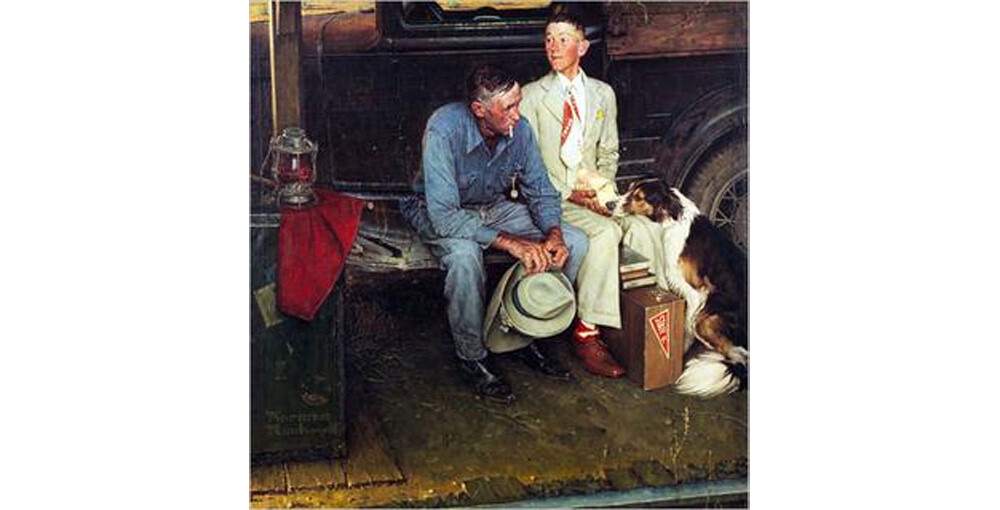4 Shady Moves Husbands Pulled to Beat Divorce Settlements

You very first introduction to the concept of divorce happened in one of two ways. Either it happened when your parents sat you down and told you they wouldn’t be living together anymore, and that you should know it was your fault. Or, it happened when you were watching some TV show or a movie and heard a husband complaining that his wife was taking him to the cleaners or bleeding him dry.
That storyline of a husband jealously guarding his fortune might be so common because scripts are written by writers, and writers are bitter, and get divorced more than the average person. (No, half of American marriages don’t really end in divorce.) For many people, though, the fear of losing half of everything to an evil ex is very real, sending them down some very strange paths.
One Cartoonist Forged a Bunch of Paintings for His Wife
In 2006, a pair of brothers cracked open the walls of the family home and found something bizarre. Hidden in a secret compartment were seven valuable paintings, stuck where no one could see them. They had belonged to the brothers’ dad, cartoonist Don Trachte, but the paintings’ presence raised many questions — especially one painting, Norman Rockwell’s Breaking Home Ties.
Don't Miss
That painting, as far as the world knew, hung in a museum, *the* Norman Rockwell museum in Massachusetts. So, this painting in dad’s secret stash had to be reproduction, right? Was Trachte secretly an art forger? He was, experts eventually determined. Except, it was the one on display in the museum that was the forgery.
Trachte bought the painting from Rockwell for $900 in 1960, since the two guys were friends. By the 1970s, when he was divorcing his wife, Breaking Home Ties was worth a fair bit more than that, and Trachte figured his art collection was under threat and wouldn’t stay in his hands much longer. So, he made a copy of the Rockwell, and presumably of half a dozen more works. He lost the copy, but thanks to his skill with a brush, he held on to ownership of the painting, in secret.

Norman Rockwell
When the truth became known, no one filed charges against Trachte, as he had died the previous year. Then the painting fetched $15.4 million at auction. Reports are vague about whether the proceeds went to sons Dave and Don Jr. or to the painting’s legal owner, but we’re sure some lawyers got very rich determining that answer.
A Deadbeat Dad Spent 14 Years in Prison for Contempt
The longest sentence ever served for contempt of court went to a lawyer, H. Beatty Chadwick. According to the court, Chadwick was refusing to pay his ex-wife the money he owed her in the divorce. According to Chadwick, he didn’t have the money. This disagreement resulted in his spending 14 years in prison — which, he noted when he was finally released, was longer than he might have gotten for committing murder.
Beatty and Bobbie Chadwick had had an ugly divorce, and an ugly marriage. Firstly, they were named Chadwick, and no couple can be expected to last long shouldering such a burden. Secondly, according to Bobbie, millionaire Beatty was a cheapskate, keeping her on a $600 monthly allowance and rationing her toilet paper usage (six squares per visit to the bathroom). Also, he scheduled sex between them every Tuesday and Thursday at 7:30 p.m., and no times other than that.

When they divorced, millions from Beatty’s accounts suddenly vanished. Then the money came back in the form of cheques written out to him. Then it vanished again. He had no idea where the money went after this, claimed Beatty.
The court didn’t believe him, and by “the court,” we mean both the court that sentenced him in 1995 and the separate court that released him in 2009. The latter judge ruled that Beatty in all likelihood still had the money squirreled away somewhere, but imprisoning him would not coerce him into paying it. As a result, imprisoning him on a contempt charge was now illegal. By this point, the man was 73, and even his ex-wife was saying to let the guy go.
Maybe we won’t find the money till he dies, and his children discover cash stacks hidden in a wall.
The Guy Who Chainsawed His House in Half
When one German man realized that divorce was about to split his home in two, he decided to beat any kind of settlement to the punch. He cut his and his wife’s house down the middle, with a chainsaw. Then he loaded up a forklift with the half he called his, and he rolled out of there.
The man was a trained mason, so he had some idea of what he was doing. The house, meanwhile, was wooden, which meant we didn’t have the issue of a chainsaw negotiating through concrete. Naturally, halving the house severed various pipes and other connections, but houses are sometimes picked up and transported, even when not on one madman’s whim. “The man was just taking his due,” said a police spokesman.

The wife had not okayed this decision. That separates this 2007 story from various other ones of couples agreeing to physically split their house. For example, we have this case out of Cambodia from the very next year. A wife found it strange that her departing husband wanted to saw their house in two, but she was cool with the idea. Both the Cambodian house and the German house were single-story and measured about 20 by 24 feet. In each case, the split was successful. The house, divided, could indeed stand.
Albert Einstein Offered His Ex a Prize He Didn’t Have
Einstein, according to his accountant, once said, “The hardest thing in the world to understand is income taxes.” Though this improbable quote is better documented than many of the quotes attributed to Einstein, the man understood taxes rather well and may have been deliberately feigning ignorance. Einstein was quite an intelligent guy (not many people know that about him), and this extended to his finances. For example, to dodge taxes, he maintained a secret bank account in the Netherlands.

When Einstein divorced his first wife Mileva Marić (on Valentine’s Day no less), he signed an agreement that saved him some money upfront. Rather than paying her as much as he might have had to, he pledged that he would give her the winnings from any future Nobel Prize that he won. At the time, he had not won any Nobel Prize, and he could offer no proof that he would win one, but the agreement went though.
A couple years later, Einstein did win the Nobel Prize in Physics. Which shows just how shrewd a move that had been, or, er, maybe it shows how the move hadn’t been so smart after all. Anyway, divorcing Marić had let him marry someone else — Elsa Einstein, his first cousin, with whom he’d been having an affair for seven years. So, Einstein was definitely a smart man in one respect: He knew what he wanted.
Follow Ryan Menezes on Twitter for more stuff no one should see.